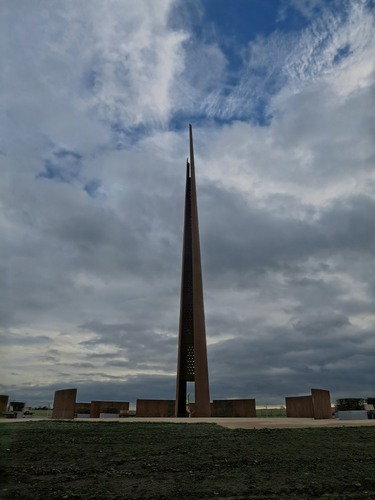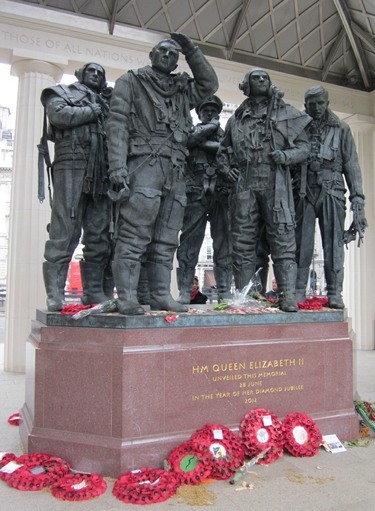“Lie in the dark and listen
It’s clear tonight so they’re flying high
Hundreds of them, thousands perhaps,
Riding the icy, moonlit sky.
Men, machinery, bombs and maps
Altimeters, guns and charts
Coffee, sandwiches, fleece lined boots
Bones and muscles and minds and hearts
English saplings with English roots
Deep in the earth they’ve left below
Lie in the dark and listen.”
This poem by Noel Coward brings back vivid memories of my boyhood. I lived in East Anglia surrounded by Bomber Command aerodromes. Just a few miles away was RAF Wyton, the home of Pathfinder Force, where my father was employed as a Link Trainer Instructor throughout the war. On my way to school the train ran alongside RAF Oakington, another Bomber Command aerodrome. Every night I would lie in bed and listen nervously as the bombers circled overhead before flying off to bomb Germany. In addition four men from my small village were killed serving in Bomber Command.
There are three major memorials commemorating the men of Bomber Command.
Runnymede Memorial
This commemorates some 20,000 missing airmen who flew from bases in the United Kingdom including Coastal Command, Fighter Command, Transport Command and those killed in training accidents.
The shrine and cloister were designed by Sir Edward Manfe with sculptures by Vernon Hill. It was unveiled by Queen Elizabeth II on 17 October 1953.
An engraving on the great North Window quotes words from Psalm 139:
“If I climb up to Heaven, Thou art there
If I go to Hell Thou are there also
If I take the wings of the morning
And remain in the uttermost parts of the sea
Even there also shall Thy hand lead me
And Thy right hand shall hold me.”
Green Park London
This commemorates 55,573 men killed serving in Bomber Command. Designed by Liam O’Connor it is built of Portland Stone and features 9 foot bronze sculptures of aircrew returning from a mission. In front a plinth shows a text from Pericles “Freedom is the sure possession of those alone who have the courage to defend it.”
The memorial was unveiled by HM The Queen on 28 June 2012. The cost (£5.6 million) was largely raised by public donations.
Lincoln Memorial Spire
This impressive 102 foot high spire stands on Cornwick Hill facing the cathedral. Its height corresponds to the wingspan of a Lancaster Bomber. Steel walls alongside are engraved with the names of all 55,573 men killed serving in Bomber Command. Designed by Stephen Palmer it was unveiled on 20 September 2015 by Lord Howe, Minister of State for Defence.
Four stained glass windows in Lincoln Cathedral depict St Michael (Bomber Command), St Raphael (Training Command), Uriel (Rhodesian Air Force) and St Gabriel (RNZAF). The Book of Remembrance lists 25,611 men killed whilst flying from Lincolnshire air bases including 1,233 Canadian, 1,140 Australian, 687 Polish, 200 New Zealanders and 90 Rhodesians.
The York Minster memorial is unusual taking the form of an Astronomical Clock over the North Transept designed by Dr R Atkinson of Royal Greenwich Observatory. An inscription reads “They went through the air and space without fear and the shining stars marked their stirring deeds.” The Book of Remembrance lists 18,000 men based in the airfields of Yorkshire, Durham and Northumberland.
The Ely Memorial Windows show 6 panels:
Aircrew in flying kit - 2 Group
Archangel Michael - 3 Group
St George and Dragon - 8 Group
An Airman - 100 Group
The Remembrance Book lists 12,000 aircrew killed serving from airfields in Cambridgeshire and Huntingdonshire.
John Symonds






